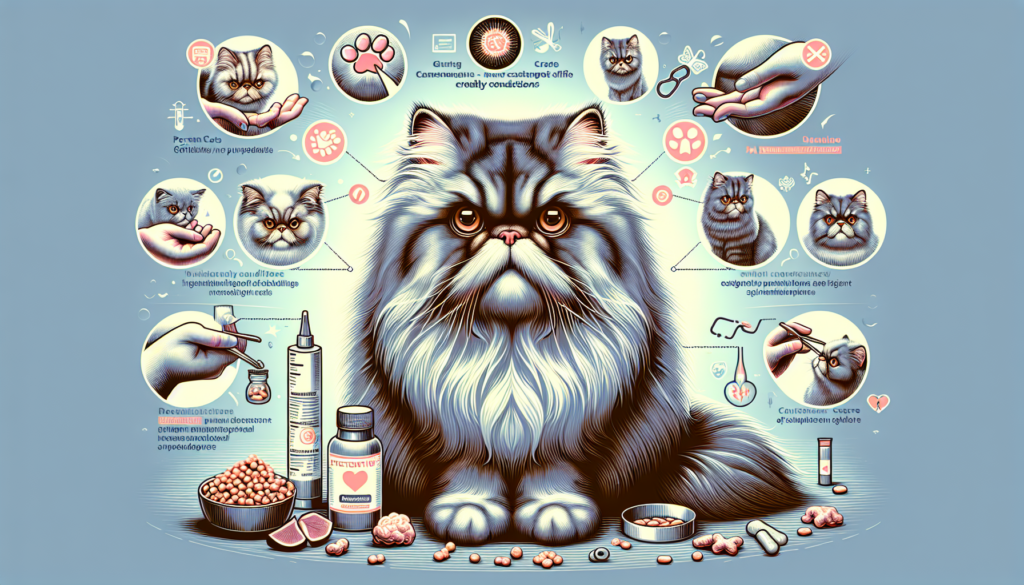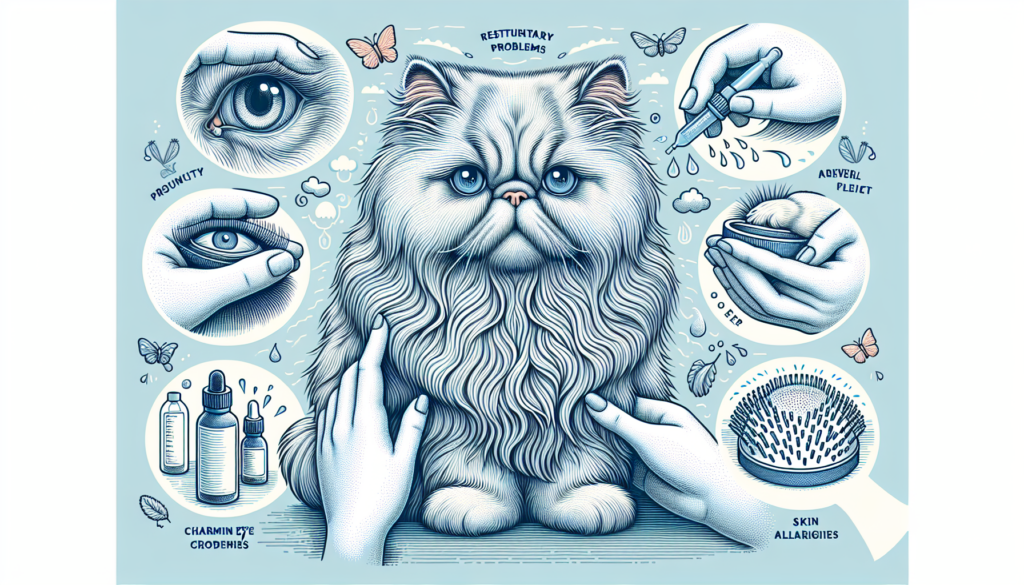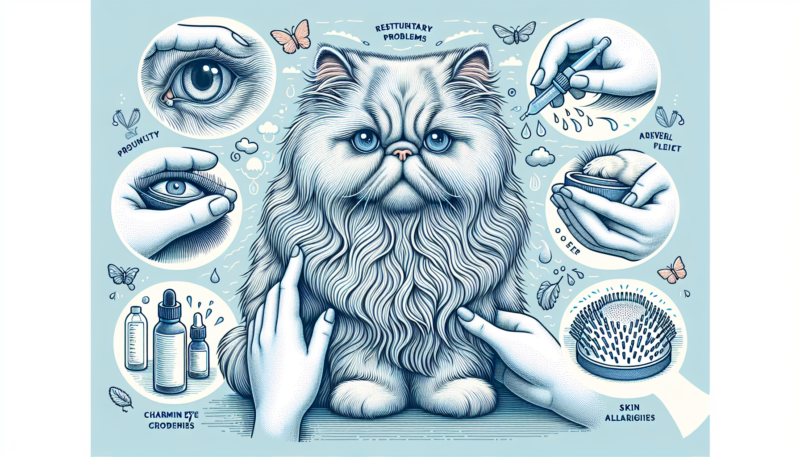Persian cats are undeniably a majestic and captivating breed, known for their luscious coats and striking appearance. But behind their regal charm, many wonder if these feline companions are prone to any health issues. This article aims to shed light on the subject, providing you with an insightful glimpse into the potential health concerns that Persian cats may face. Whether you’re considering adopting one or already have a fluffy friend at home, understanding these issues can help ensure the well-being of your beloved pet.

Overview of Persian Cats
Persian cats are a beloved breed known for their long, luxurious coats and distinctive facial features. They have been around for centuries and are widely recognized as one of the oldest and most popular cat breeds in the world. With their calm and gentle nature, Persians make wonderful companions for individuals and families alike.
However, it’s important to note that Persian cats are prone to certain health issues due to their unique anatomy and genetic predispositions. In this article, we’ll explore the common health problems that Persians often face, including respiratory problems, eye conditions, dental issues, skin problems, and polycystic kidney disease. We’ll also discuss preventive measures and treatment options to ensure your Persian cat leads a happy and healthy life.
History of Persian Cats
The history of Persian cats can be traced back to ancient times, where they were believed to have originated in Persia (modern-day Iran) or Turkey. These elegant felines quickly gained popularity across the world, with their distinctive appearance and regal demeanor captivating cat lovers everywhere. Over the centuries, Persians have been favored by royalty and have even been depicted in various works of art.
Physical Characteristics of Persian Cats
When it comes to physical attributes, Persian cats are renowned for their unique features. They have a rounded head with a short, broad nose and large, expressive eyes. Their dense, silky coats come in a wide range of colors, including solid, shaded, and tabby patterns. Persian cats also have a stocky build and short legs, giving them a somewhat plump and cuddly appearance.
Common Health Issues in Persian Cats
While Persian cats are undeniably beautiful, they are unfortunately more prone to certain health problems compared to other breeds. It is crucial for owners to be aware of these potential issues and stay proactive in maintaining their Persian’s well-being through regular check-ups, proper grooming, and a balanced diet.
Respiratory Problems
Respiratory problems are one of the most prevalent health issues in Persian cats. Due to their brachycephalic (short-nosed) facial structure, they are susceptible to conditions such as Brachycephalic Airway Syndrome. This syndrome can cause difficulty in breathing, which may manifest as loud snoring, wheezing, and shortness of breath.
Another common respiratory issue is nasal congestion and discharge. Persians may experience frequent or chronic sneezing, accompanied by a clear or thick mucus-like discharge from the nose. These symptoms can be caused by infections, allergies, or even foreign objects lodged in the nasal passages.
Eye Conditions
Persian cats are also predisposed to various eye conditions. Tear duct abnormalities are often seen, resulting in excessive tearing and discharge from the eyes. This can lead to uncomfortable and unsightly tear stains on the fur around the eyes if not properly addressed.
Another concerning eye issue is the prolapse of the third eyelid, which can occur due to weak connective tissues. This condition may cause redness and irritation in the affected eye. Additionally, Persians are prone to developing cherry eye, where a gland in the eyelid protrudes, requiring surgical intervention to correct.
Progressive Retinal Atrophy (PRA) is another eye condition found in Persian cats. It is a genetic disorder that leads to the degeneration of the retina over time, eventually causing vision loss. Regular eye examinations are essential to detect such conditions early on and provide appropriate treatment.
Dental Issues
Maintaining good dental health is crucial for Persian cats. They are prone to gum disease, which can lead to tooth decay, bad breath, and even tooth loss if left untreated. Regular dental check-ups and teeth cleanings performed by a veterinarian can help prevent these issues.
Oral ulcers are another common dental problem in Persians. These painful sores can form on the gums or tongue, making it uncomfortable for the cat to eat or groom. Identifying the underlying cause and addressing it promptly is crucial for proper treatment and alleviation of discomfort.
Skin Problems
Persian cats’ beautiful coats require regular grooming to keep them in prime condition. However, they are also susceptible to various skin problems. Fungal infections, such as ringworm, can cause patchy hair loss and skin irritation. Prompt treatment with antifungal medications is essential to prevent the spread of infection and promote healthy skin regrowth.
Parasitic infestations, such as fleas or mites, can also affect Persian cats. These tiny pests cause itching, hair loss, and skin inflammation. Regular use of veterinarian-recommended flea prevention products and maintaining a clean living environment can help prevent these issues.
Additionally, Persians may develop allergies to certain substances, such as pollen, dust mites, or certain ingredients in their food. allergies can cause itching, redness, and skin lesions. Identifying and eliminating the allergen, along with appropriate medical management, can help alleviate the cat’s discomfort.
Polycystic Kidney Disease
Polycystic Kidney Disease (PKD) is a genetic condition that affects Persian cats more frequently than other breeds. This condition causes fluid-filled cysts to form in the kidneys, which gradually lead to kidney dysfunction and potential organ failure. Early detection through regular screenings and genetic testing is crucial, as treatment options are limited once the disease progresses.

Preventive Measures for Persian Cat Health
While Persian cats may be prone to certain health issues, there are steps owners can take to help prevent them.
Regular veterinary check-ups are crucial to catch any potential health problems early on. Your veterinarian can perform thorough examinations, administer vaccines, and provide advice on proper nutrition and parasite prevention.
Maintaining a balanced diet is another preventive measure. High-quality cat food that meets the specific nutritional needs of Persians should be chosen. Feeding a combination of wet and dry food can help maintain a healthy weight and provide essential nutrients.
Proper grooming is essential for Persians, given their long coats. Regular brushing helps prevent mats and tangles, which can harbor bacteria and lead to skin problems. Additionally, routine ear cleaning, nail trimming, and dental care contribute to the overall well-being of your Persian cat.
Brachycephalic Airway Syndrome
Brachycephalic Airway Syndrome is a specific respiratory problem commonly seen in Persians and other breeds with short noses. This condition occurs due to the compression of the airway structures, leading to difficulty in breathing.
Symptoms of Brachycephalic Airway Syndrome include noisy breathing, snoring, and respiratory distress, especially during physical activity or hot weather. In severe cases, affected cats may even collapse. Surgical intervention to widen the airway may be necessary to alleviate the symptoms and improve the cat’s quality of life.
Conclusion
Persian cats are undeniably stunning and make wonderful companions. However, it’s important to be aware of the common health issues they may face. By being proactive in preventive measures, regular veterinary care, and prompt treatment of any health concerns, you can ensure your Persian cat leads a long, happy, and healthy life. With proper attention and care, your Persian cat can enjoy a lifetime of purrs and companionship.
